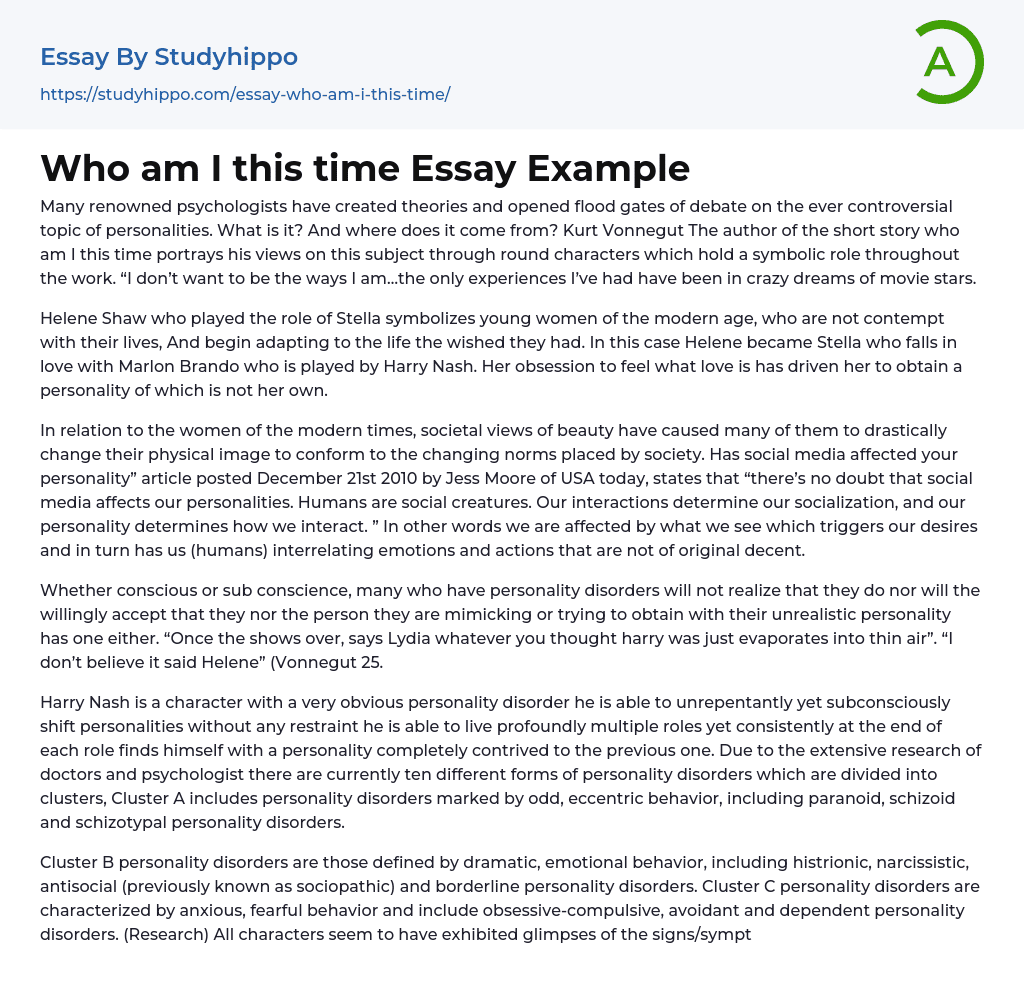Many renowned psychologists have created theories and opened flood gates of debate on the ever controversial topic of personalities. What is it? And where does it come from? Kurt Vonnegut The author of the short story who am I this time portrays his views on this subject through round characters which hold a symbolic role throughout the work. “I don’t want to be the ways I am…the only experiences I’ve had have been in crazy dreams of movie stars.
Helene Shaw who played the role of Stella symbolizes young women of the modern age, who are not contempt with their lives, And begin adapting to the life the wished they had. In this case Helene became Stella who falls in love with Marlon Brando who is played by Harry Nash. Her obsession to feel what love is has driven her to obtain a
...personality of which is not her own.
In relation to the women of the modern times, societal views of beauty have caused many of them to drastically change their physical image to conform to the changing norms placed by society. Has social media affected your personality” article posted December 21st 2010 by Jess Moore of USA today, states that “there’s no doubt that social media affects our personalities. Humans are social creatures. Our interactions determine our socialization, and our personality determines how we interact. ” In other words we are affected by what we see which triggers our desires and in turn has us (humans) interrelating emotions and actions that are not of original decent.
Whether conscious or sub conscience, many who have personality disorders will no
realize that they do nor will the willingly accept that they nor the person they are mimicking or trying to obtain with their unrealistic personality has one either. “Once the shows over, says Lydia whatever you thought harry was just evaporates into thin air”. “I don’t believe it said Helene” (Vonnegut 25.
Harry Nash is a character with a very obvious personality disorder he is able to unrepentantly yet subconsciously shift personalities without any restraint he is able to live profoundly multiple roles yet consistently at the end of each role finds himself with a personality completely contrived to the previous one. Due to the extensive research of doctors and psychologist there are currently ten different forms of personality disorders which are divided into clusters, Cluster A includes personality disorders marked by odd, eccentric behavior, including paranoid, schizoid and schizotypal personality disorders.
Cluster B personality disorders are those defined by dramatic, emotional behavior, including histrionic, narcissistic, antisocial (previously known as sociopathic) and borderline personality disorders. Cluster C personality disorders are characterized by anxious, fearful behavior and include obsessive-compulsive, avoidant and dependent personality disorders. (Research) All characters seem to have exhibited glimpses of the signs/symptoms stated above. Lydia slunk away, feeling about as frowzy and unloved as she was supposed to feel in the play” (Vonnegut 25. Lydia, a minor character in the story tries to warn Helene about Harry’s disorder but once she wasn’t believed she finds herself slumming in the personality of the character that she was trying to personify proving that the outcome of her emotions were dependent on the reactions of the primary individual in this case Helen.
Has
society and the media over done it? Due to the mass influence of the media about one in seven U. S. adults has at least one personality disorder, and many have more than one. Obsessive-compulsive personality disorder is the most common, affecting nearly 8 percent of Americans. Paranoid personality disorder affects 4. 4 percent; antisocial personality disorder, 3. 6 percent; schizoid personality disorder, 3. 1 percent; schizotypal personality disorder, 3 percent; avoidant personality disorder, 2. 4 percent; borderline personality disorder, 2 percent; and histrionic personality disorder, 1. 8 percent.
Both narcissistic and dependent personality disorders affect less than 1 percent of U. S. adults. (Research) in retrospect ,Vonnegut presented a theory all in itself in this short story people can literally become that which they see without ever really establish their own personal identity as long as in the end they are able to peacefully coexist with the norms of the rest of society which is what we see with the marriage of harry and Helene or better said Stella and Marlon, Romeo and Juliet etc. all in one person.
- Emergence essays
- Anxiety Disorder essays
- Post-traumatic Stress Disorder essays
- Stream essays
- Insanity essays
- Addiction essays
- Anatomy and Physiology essays
- Biodegradation essays
- Cancer essays
- Dental Care essays
- Disability essays
- Disease essays
- Disorders essays
- Health Care essays
- Infectious Disease essays
- Inquiry essays
- Intelligence Quotient essays
- Lung Cancer essays
- Medicine essays
- Neurology essays
- Nutrition essays
- Olfaction essays
- Physical Exercise essays
- Public Health essays
- Sex essays
- Women's Health essays
- World health organization essays
- Air Pollution essays
- Carbon Dioxide essays
- Climate essays
- Deforestation essays
- Ecology essays
- Endangered Species essays
- Environmental Issues essays
- Environmental Protection essays
- flood essays
- Greenhouse Gas essays
- Hurricane essays
- Nature essays
- Pollution essays
- Renewable Energy essays
- Sustainability essays
- Tornado essays
- Traffic essays
- Tsunami essays
- Water Pollution essays
- American Dream essays
- Barriers To Entry essays
- Capitalism essays
- Central Bank essays




